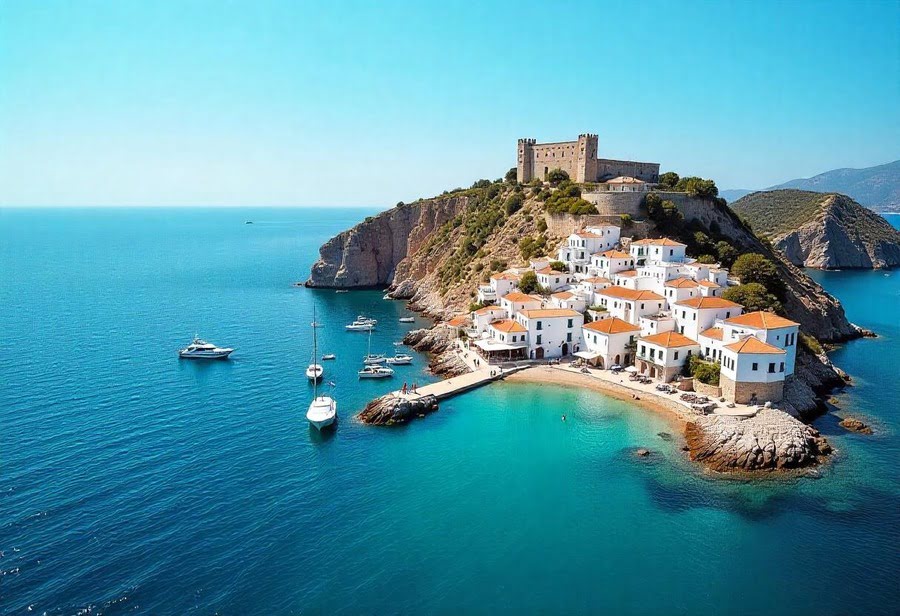<> Viral of Today <>
Home » TOURISM NEWS » Greece’s Tourism Future Takes Shape With The Powerful Launch Of DMMO For Santorini, Folegandros, And The Entire Cycladic Island Group, Paving The Way For Bold Innovation Friday, June 6, 2025In a groundbreaking move to shape the future of Greek tourism, the government has announced the establishment of a Destination Marketing and Management Organization (DMMO) for Santorini and Folegandros, alongside neighboring Cycladic islands. This strategic initiative aims to promote sustainable tourism, ensuring that the islands’ iconic landscapes and cultural heritage are preserved despite increasing visitor numbers. By launching this game-changing DMMO, Greece is paving the way for smarter, more balanced tourism practices that will allow these islands to thrive sustainably while maintaining their unique identities. The move is set to reshape the tourism landscape of the Cycladic Islands, fostering long-term growth and innovation for years to come.Olga Kefalogianni, Greece’s Tourism Minister, recently revealed the establishment of a Destination Marketing and Management Organization (DMMO) for the Municipality of Thira, home to the renowned island of Santorini. The announcement came during the 6th Regional Conference of the Hellenic Hoteliers Federation, which was held this week on the island. Kefalogianni, representing Prime Minister Kyriakos Mitsotakis at the event, emphasized the importance of this new initiative for the future of Santorini and its surrounding islands.The formation of the DMMO is a significant step towards supporting the island’s tourism sector, which has seen immense growth in recent years. Kefalogianni highlighted that the organization would play a vital role in advancing sustainable tourism on Santorini, safeguarding the island’s remarkable landscapes, cultural heritage, and distinct identity for generations to come. With tourism numbers steadily increasing, the DMMO will focus on striking a balance between welcoming visitors and protecting the local environment and community from the pressures of over-tourism.As part of this initiative, Kefalogianni also signed a memorandum of understanding (MoU) to create similar Destination Marketing and Management Organizations in neighboring municipalities. These include Anafi, Sikinos, Ios, and Folegandros, all of which are part of the Cycladic island group. The idea is to extend the benefits of the DMMO model beyond Santorini to other islands in the region, creating a broader, more sustainable approach to tourism across the entire area. By doing so, Kefalogianni hopes to distribute tourist traffic more evenly, preventing the overburdening of any one location while also boosting the economies of less-visited islands.During her speech, Kefalogianni also acknowledged the challenges that Santorini has faced in recent months, particularly following the seismic activity that affected the island earlier this year. The natural disasters have put additional strain on local infrastructure and communities, but Kefalogianni expressed confidence that with government support and the right resilience-building measures, Santorini will overcome these challenges. She reiterated that the government is committed to assisting the island, ensuring that it remains a top global destination while mitigating the impact of such events.One of the key aspects of Greece’s national tourism strategy, which Kefalogianni highlighted, is extending the tourism season. Traditionally, the peak tourist season in Greece is during the summer months, but there is an increasing focus on attracting visitors during the off-peak seasons. By doing so, the government aims to reduce the pressure on popular destinations during the high season and create a more year-round tourism economy. Kefalogianni pointed out that the seasonal spread of tourism would be beneficial not just for Santorini, but for other parts of Greece as well, as it will help diversify the country’s tourism offerings and ensure a steadier flow of income for local businesses throughout the year.In addition to prolonging the tourism season, Kefalogianni highlighted the importance of improving the competitiveness of Greece’s tourism sector through various legislative reforms. These reforms are designed to make the country’s tourism infrastructure more sustainable and efficient. Among the reforms she mentioned were updates to the institutional framework for tourist ports, which will improve the overall experience for travelers arriving by sea. Additionally, the government is working on enhancing health and wellness facilities, as well as complex accommodations that can cater to the growing demand for luxury and specialized travel experiences.Another significant element of the tourism strategy is the regulation of short-term rentals. Kefalogianni stressed that the increasing number of short-term rental properties in tourist hotspots like Santorini has raised concerns about the quality of the local hospitality industry. By regulating short-term rentals, the government aims to preserve the quality of accommodation options while preventing the displacement of local residents due to rising rental prices. This regulation will ensure that the island’s hospitality remains in line with international standards and supports sustainable growth in the sector.Kefalogianni also touched upon the recent amendments to the Development Law, which have been designed to ensure that tourism remains integrated into Greece’s broader economic planning. These amendments focus on supporting investments in accommodation upgrades, with a particular emphasis on alternative tourism offerings such as eco-tourism and cultural tourism. The aim is to diversify Greece’s tourism offerings beyond the traditional beach holidays and attract visitors seeking more unique, immersive experiences.Greece has launched a groundbreaking Destination Marketing and Management Organization (DMMO) for Santorini and Folegandros, marking a strategic step towards sustainable tourism in the Cycladic Islands. This bold initiative aims to ensure balanced growth while preserving the islands’ unique cultural and natural heritage.The creation of the DMMO for Santorini and the broader regional tourism strategy reflect the Greek government’s commitment to balancing the needs of the tourism industry with the preservation of the country’s cultural and environmental heritage. Kefalogianni’s announcement is a timely reminder of the importance of sustainable tourism practices, especially in destinations like Santorini, where the delicate balance between economic growth and environmental preservation is under constant scrutiny. The DMMOs are set to play a crucial role in ensuring that the future of tourism in Greece is both sustainable and inclusive, benefiting local communities and the economy while protecting the country’s most cherished destinations.
This information will surprise you!
See also
- Read until the end to discover everything.
- Important information you need to know.
- Interesting facts and helpful tips.
Conclusion
Did you enjoy the news? Keep following us daily!

